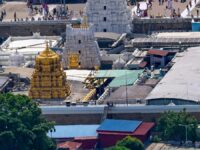Pushp Saraf
A mass agitation has erupted in Gilgit-Baltistan (GB), an Indian territory under Pakistan’s illegal occupation, after Islamabad’s attempt to impose federal taxes on the region. On August 30, GB witnessed a sweeping shutter-down strike as residents voiced their fury. Reading the public mood, the local government quickly endorsed the demand to declare GB a non-tariff area, grant exemptions from sales and income taxes and withdraw cases filed against protesting traders.
Yet, instead of offering real relief, Pakistan’s federal government has merely announced the creation of a committee—headed by federal minister Sardar Awais Ahmad Khan Leghari – to “devise a solution.” The move reeks of stalling rather than sympathy.
The irony of the situation is hard to miss. The GB cabinet is not an independent voice of the people but a coalition stitched together from Pakistan’s mainstream parties – the PML-N, PPP, JUI-F and a breakaway PTI faction, since expelled, led by Chief Minister Gulbar Khan. Despite their allegiance to the same political order that dominates Islamabad, the GB leadership has been compelled to echo popular demands against federal taxation. This is not born of conviction but of necessity—public pressure has left them with no alternative.
This forced divergence between Islamabad’s will and local aspirations lays bare the democratic deficit at the heart of GB’s governance. Governments in the region are not the organic outcome of people’s will but artificial constructs, imposed and sustained by power centres in Pakistan. Local administrations thus functions less as representatives of their electorate and more as extensions of federal authority.
The ongoing agitation has only reaffirmed this truth; while the people of GB struggle for rights and identity, their so-called governments remain trapped-torn between loyalty to Islamabad and the desperate need to salvage a semblance of legitimacy at home.
Centre of resistance
The roots of the present turmoil lie in the otherwise quiet border town of Sost – the first formal dry port on the China-Pakistan border. Perched on the Karakoram Highway, Sost is far more than a trading outpost: it is the nerve centre for customs clearance and cross-border commerce, governing the flow of goods between Pakistan and China’s Xinjiang region.
For the past two months, however, this lifeline of trade has transformed into the epicenter of resistance. Traders in Sost have staged relentless sit-ins and blockades along the highway, demanding exemptions from Islamabad’s tax regime and relief from punitive measures. Their defiance has effectively paralyzed Pakistan-China trade. The consequences have rippled outward: transporters, traders, hoteliers, and even tourists who rely on this route have been left stranded, their livelihoods hanging in uncertainty.
But the unrest in Sost is not just a local crisis – it reverberates across borders. As a pivotal gateway of the China-Pakistan Economic Corridor (CPEC), any prolonged disruption undermines the very project Islamabad touts as a symbol of prosperity and partnership. The inability to ensure smooth operations here not only destabilises local economies but also calls into question Pakistan’s capacity to safeguard one of China’s most sensitive and strategically vital trade arteries.
Closing its eyes to both logic and historical fact, Pakistan has handed China virtually a free hand in GB – most notably by making the region the entry point of the CPEC. Yet GB is not Pakistan’s to dispose of. As part of the erstwhile princely State of Jammu and Kashmir, the territory legally acceded to India in 1947. After the bifurcation and re-organisation of J&K on August 5, 2019, GB now forms an integral part of the Union Territory of Ladakh.
India has consistently and unequivocally conveyed its anger and opposition to Pakistan-China collusion in undertaking unauthorised projects in GB.
Resilience of the people
For the people of the region, this reality is bitterly familiar. Time and again, they have risen in protest against both economic exploitation and political marginalisation. Their plight has been further deepened by Islamabad’s demographic engineering: the Shia-majority population has been systematically targeted through deliberate efforts to alter the sectarian balance by settling Sunnis—including extremist elements – from Pakistan. Fearful of GB’s Jammu & Kashmir antecedents, Islamabad has relied on ruthless suppression to silence dissent and tighten its grip.
Even Pakistan’s own media cannot ignore these contradictions. Commenting on the ongoing “Sost protest,” Dawn noted: “the issue of federal taxes imposed on GB is not a new one, as there is widespread support across the territory.” The paper remarked: “Islamabad, on the other hand, is hesitant to give GB provincial status until the Kashmir dispute with India is settled. The committee recently formed by the prime minister to look into the traders’ demands needs to come up with a fair solution in consultation with GB’s elected representatives…a just solution should be explored that balances regional demands with the fiscal needs of the state, while also not harming Pakistan’s case vis-à-vis the Kashmir dispute.”
On August 28, a special committee of the GB cabinet, comprising local ministers, openly declared Islamabad’s taxation move “legally untenable within GB’s constitutional framework.” Its recommendations were unambiguous: goods imported exclusively for GB consumption should remain tax-free; a joint customs clearance desk should be established at Sost Dry Port to ensure transparent processing of GB-bound consignments; strict enforcement should prevent the diversion of exempted goods outside the region, with violators facing legal action; and the hundreds of stranded containers should be cleared swiftly through a one-time amnesty scheme.
Resistance to federal taxation, however, is not the agenda of one faction – it cuts across the political spectrum. The Balwaristan National Front (BNF), led by Nawaz Khan Naji, has long maintained that as a disputed territory without constitutional representation, GB must remain a tax-free zone. The Gilgit-Baltistan United Movement (GBUM) echoes this position arguing that the imposition of federal taxes—particularly on goods routed through Sost – is both constitutionally indefensible and politically untenable. Local activists have gone further still, describing Islamabad’s policy as an act of “economic murder,” a deliberate strategy of systematic deprivation aimed at disempowering the region’s population.
In trying to tax GB into submission, Pakistan has only exposed the illegitimacy of its rule and .deepened the people’s resolve to resist. (Courtesy: Border Affairs)


















